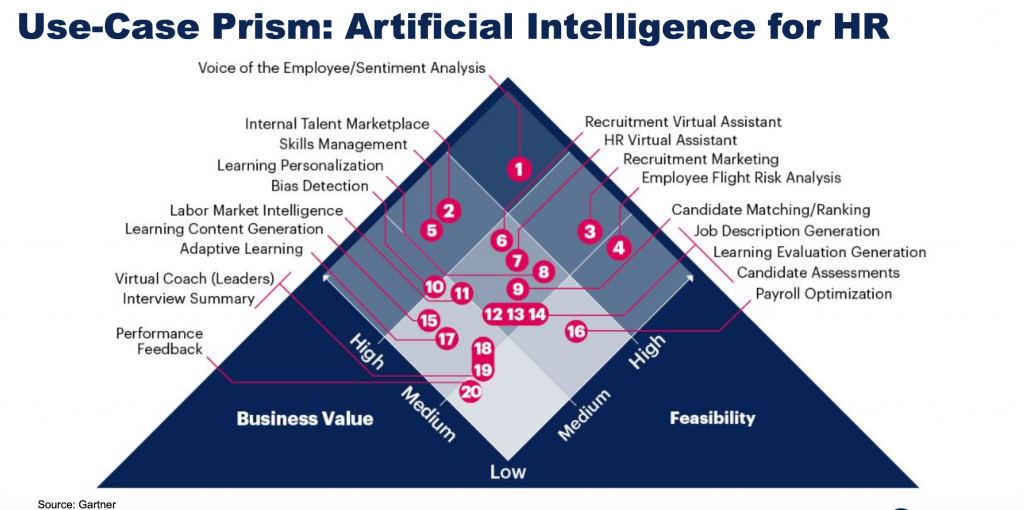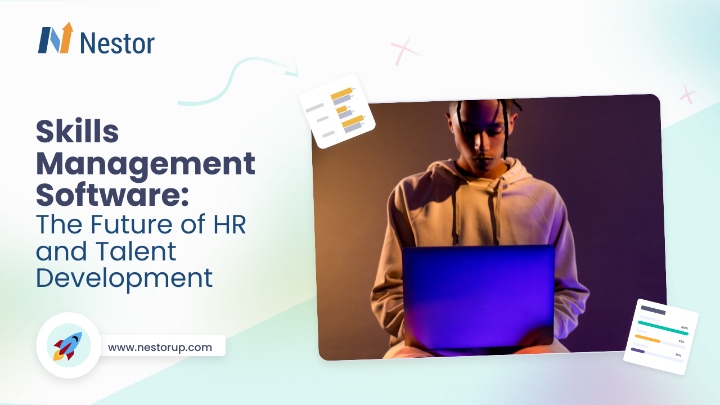
As the new year is quickly approaching, the world of HR is undergoing a profound evolution shaped by impressive technological developments, socio-economic changes, and an ever-shifting employment landscape — all determining and shaping the top HR trends in 2024.
As we explore these innovative strategies and emerging practices, you’ll notice that most of them are actually trends from 2023 (or even earlier). These trends are moving on to their next stage of evolution and thus presenting businesses and HR departments with both opportunities and challenges to readjust, redefine, and thrive in the new dynamic world of work.
Let’s dive right in and have a look at what the world of HR is likely to look like in 2024!
1. Skills will take center stage in more organizations
Skills and skills-based approaches will not be new HR trends in 2024, but will definitely be among the most impactful ones. Skill gaps, talent shortages, and the short lifespan of skills will turn them into one of the most important priorities for organizations going forward.
Skills-based approaches can redefine the entire talent lifecycle, from attracting and hiring to developing and redeploying talent! When implemented well, these approaches will completely transform your business, starting with expanding talent pools and better matching the right people with the right roles ensuring strategic workforce planning.
Skills-based approaches can also optimize L&D initiatives and nurture more dynamic and fulfilling career pathways — increasing employee engagement and satisfaction while the organization achieves higher levels of agility and productivity.
With so many benefits and successful use cases, like democratizing career development, ensuring internal mobility and reducing attrition, skills-based approaches definitely sounds tempting to many organizations, yet difficult to implement and get the processes started.
Learn how to overcome the challenges to implementing skills-based talent strategies.

2. Testing and preparing the adoption of AI with different use cases
Second on our list of HR trends in 2024, AI has long been a buzzword at the center of conflicting discussions and heated debates (and still is). One thing that has changed, however, with the introduction of ChatGPT (and other generative tools), is the awareness and acknowledgment that these solutions have now evolved enough to actually be useful in the professional world across a wide range of jobs, projects, and tasks — slowly transforming into digital coworkers for many.
The impact of generative AI is bound to grow further in 2024, especially when looking at how fast new models are being developed and improved. For example, Google has recently announced Gemini, while Josh Bersin’s company has released Galileo — The World’s First AI-Powered Expert Assistant for HR.
Many C-level executives and HR departments are already thinking about integrating AI into their organization (and you should, too), realizing that failing to adopt it at least to some extent in 2024 will result in the company falling behind the competition.
Next year, we’ll see HR’s contribution to the adoption of AI split into two main areas:
Adopting AI in HR
This step is about understanding all the various applications and limitations of different AI-powered tools in the HR department itself. It’s about testing things like:
- Writing better job descriptions and more personalized interview questions
- Creating more tailored learning plans, evaluations, and course summaries
- Identifying high- and under-performers, as well as people with a high attrition risk
- Using AI as a virtual personal assistant or HR self-service for employees

Learn more about the most common use cases of ChatGPT in HR.
Preparing the organization-wide adoption of AI
HR will also collaborate with people managers, IT, and other stakeholders to develop the evaluation frameworks to select the best-suited AI tech, which will be followed by:
- creating and enforcing policies regarding the use of AI within the company
- defining methods of ensuring data privacy and security when using AI tools
- offering training on using these tools and following intellectual property laws
- setting up human review systems and procedures to eliminate machine errors and biases
AI won’t replace people but people who can use AI will replace people who don’t. So keeping yourself current with how AI, for example, machine learning will impact your job, and will impact the majority of jobs is important.
— Julie Jungalwala, Co-Founder and President, Academic Leadership Group

Watch our entire conversation with Julie Jungalwala to learn more about the future of learning and the most critical skills needed in an AI-driven world.
3. Upskilling, reskilling, and internal mobility as answers to talent shortages
One of the changes we’re going to see looking forward is going to be about talent development and how you get the most out of your own employees because you won’t be able to necessarily rely on constantly going external to find new talent.
— Paul Falcone, Bestselling Author and International Keynote Speaker

Investing in training and developing existing workers isn’t only about addressing current skill gaps and shortages. According to Paul, it’s also determined by the dynamics of workforce demographics and declining birth rates in developed countries, which aren’t expected (or likely) to change in 2024 and beyond.
Watch our entire conversation with Paul Falcone, one of the top guests on our podcast, as he reveals the secrets behind navigating uncertain times and tackling talent scarcity due to changing workforce demographics (among other things).
According to a Coursera report, “over 60% of workers will need retraining by 2027, but only 50% have access.” In this context, we’ll see even more organizations focus on building the right skills instead of finding them and enhancing L&D resource allocation significantly. We’ll witness an increase in:
- becoming aware of the skills within the company and their evolution over time, which is where skills management comes in
- providing a wider range of personalized internal development opportunities (e.g., coaching, mentoring, talent sharing) that align the ambitions of employees with business objectives
- embracing non-linear career paths and opening up more flexible professional opportunities to people (lateral and cross-departmental moves)
Providing growth and learning opportunities, in all their forms — upskilling, reskilling, leveraged by internal mobility — will also help HR departments improve retention rates, which will remain a top priority in a tight talent market that isn’t expected to change next year.
Discover the role of career development in employee retention.
4. A closer partnership between HR and people managers
As HR’s role is shifting from administrative tasks to a strategic and facilitator one, HR will be responsible for building a stronger partnership with people managers, who need support, as any other employee.
Together, this collaboration between HR and people managers will help the latter make more informed decisions, with regards to internal promotions, customized development plans, or implementing initiatives to address underperformance and retain the top employees.
HR can also play an active role in helping people managers make a smoother transition toward a more coaching style of leadership, in which goals are set collaboratively, feedback and check-ins become regular sessions, and the focus is on encouraging self-discovery, problem-solving, and skill-building among team members.
This requires a mix of leadership and soft skills, like empathy, open communication or conflict resolution in addressing the new employees expectations and leading their team to common success.
5. Hybrid, remote, and new work models are here to stay
Despite recent studies showing that 9 in 10 companies plan to ask their workers to return to the office by the end of 2024, the reality of the situation is much more complex. In fact, even giants like Google and Apple have faced pushback from their employees against this policy.
While fully remote work isn’t an option for every type of organization, many are already realizing that after a successful work-from-home period during the pandemic, their talent isn’t convinced about being in the office five days a week again.
One thing is clear: the new way of doing work isn’t going anywhere in 2024 (or beyond), and companies will need to embrace a flexible mindset in order to remain attractive employers (especially for Gen Zers) and sustain high levels of satisfaction and engagement.
One important consequence of remote work is the emergence of new paradigms and more flexible arrangements, such as gig work and project-based collaborations — that are making their way in the new world of work. Another development we’re already seeing is a slow but steady shift from work hours to real measurable output, or in other words, a shift in how we define and evaluate productivity and what it takes to nurture and support it remotely.
Of course, some of the challenges of hybrid and remote work that are ongoing since the transition began and will continue in 2024 are:
- finding ways to facilitate employees’ relocation to other states or countries, with different laws and taxes (which will also expand the pool of remote talent)
- proactively addressing employee expectations and transparently communicating performance requirements in this new hybrid/remote environment
- developing and maintaining the organizational culture remotely, which is deeply needed for team cohesion and smooth collaboration
6. Gen Z will take another step toward becoming the dominant generation in the workforce
90% of workers are affected by mental health challenges, either personally or through someone they are close to.
— World Economic Forum
Number #6 on our list of HR trends in 2024 is Gen Z! By as early as 2025, Gen Zers (or Zoomers) are expected to make up over a quarter (27%) of the global workforce, according to the WEF. And, by 2030 — which isn’t that far away — that percentage will more than double, reaching 58%, according to insights from PwC.
This means next year members of Gen Z will keep searching, applying, and more importantly, switching jobs rather quickly — something they are known to do when feeling that growth opportunities aren’t available or they aren’t aligned with the company’s values and mission.
Their increasing presence in the workforce in 2024 will put additional pressure on companies to prioritize things like:
- employee growth and development, which will become essential for retaining and engaging Gen Zers
- mental health, which is not only a challenge for this generation but also something they are very aware of and more willing to discuss openly
- alternative work lifestyles, including hybrid/remote work but not limited to these approaches (e.g., the four-day work week)
- creating a strong sense of belonging that inspires and motivates Zoomers to be at their best
- finding the right balance between supporting older workforce generations and accommodating the new one
Explore the key characteristics of Gen Z.
7. HR tech will further facilitate the HR transformation process
One of the most impactful HR trends in 2024 will be the transformation of this department, with the most important aspect being its shift from an administrative into a much more strategic and facilitator role — something we can call HR 2.0.
In this new role, HR will ensure that its strategies are properly aligned with the long-term objectives and sustainable success of the organization.
To succeed in aligning all these processes and business goals, HR must consider a consolidated HR tech stack which may include Skills Management, Analytic Tools, internal Talent Marketplaces, Learning Experience platforms that can address the most pressing issues related to:
- identifying significant skills gaps
- connecting talent supply to demand (skill needs and opportunities)
- enhancing internal mobility
- developing an agile workforce with up-to-date skills through continuous upskilling and reskilling programs
- surfacing new talent pools
- bottlenecks and causes of underperforming teams
- ineffective L&D programs
- pinpointing retention risks
Learn more about HR transformation.
8. Prioritizing mental health and well-being in a digital world
Closely related to change management and employee experience, it’s hardly surprising that the mental health and overall well-being of workers will be among the most significant HR trends in 2024.
Challenges in this area are many. Companies will need to focus on addressing worker stress, which has hit a historic high, and find ways to encourage self-care even when people aren’t present in the office.
Something as innocently sounding as Zoom fatigue also can, in time, have undesirable side effects, particularly for people who spend a lot of hours in virtual meetings (e.g., sales representatives).
It will become more important than ever to create real connections and spend quality time together as a team, through real-life social interactions that foster strong bonding and improve the overall sentiment of employees.
Another aspect is expectation management — something that will fall, again, on the shoulders of leaders and managers. Their people will have questions related to personal concerns:
- What if we’ll eventually be replaced by AI or automation?
- Why aren’t we offered opportunities to upskill or reskill?
- If my company adopts AI, how will this affect my job and (performance) expectations?
These are only some of the things that will start being addressed even more as next year will see mental health begin to slowly and gradually integrate into the larger talent and performance management strategies.
9. Employee experience set to make an even greater difference
Talent shortages, low engagement levels, and the tendency of newer workforce generations to change jobs quickly when their needs and expectations aren’t met means that prioritizing the employee experience will remain one of the top HR trends in 2024, just like in previous years.
While it can start with something as simple as authentic communication and developing a positive work environment where engagement arises naturally, there are specific pain points that HR, L&D, and team leads will focus on to radically improve the employee experience next year, including:
- limiting biases when it comes to performance evaluations and promotions
- democratizing career development and encouraging people to take charge of their professional future
- offering equitable and fair access to learning and development opportunities
- fostering a culture of learning instead of one of knowing, as encouraged by Julie Jugalawa in our podcast
- gathering and listening to employee feedback regarding return-to-office policies
- listening to people’s opinions to provide more valuable and personalized (extra) benefits: e.g., gas vouchers, budgets for arranging home offices, gym memberships, therapy support, etc.
- addressing unsustainable performance expectations that lead to serious conditions, like burnout
- improving the company’s pay equity and transparency
- finding effective ways to help people return to desirable performance levels after they suffer personal setbacks
10. Efficiency will be essential to remain competitive
Driven by slower than expected economic growth and other socio-economic factors, even big-name companies like Amazon, Microsoft, and LinkedIn have announced layoffs during 2023, in an effort to balance the books and ensure sustainable growth.
And regardless of what the economic situation will look like this year, we expect to see other companies look at ways to be as effective as possible and make the most out of the available resources — which can take many forms, such as:
- streamlining processes and eliminating unnecessary steps
- leveraging technology (like AI) to automate repetitive tasks
- outsourcing business functions that aren’t critical
- freezing hiring for new positions
Deloitte is an excellent example of using the latest tech to address multiple internal problems. According to the Economic Times, the multinational company is looking at ways to use AI in order to avoid mass layoffs in the future. How?
Deloitte leverages AI to assess the current skills of its employees and create plans to redeploy them in other business departments, where the demand for talent is higher. Or, in other words, it’s actually a reskilling process, facilitated by cutting-edge tech, that helps people avoid redundancy.
Frequently Asked Questions (FAQs) about HR trends in 2024
What is the HR vision for 2024?
In 2024, HR will largely be influenced by the same trends and developments from 2023, which we can split into a few large categories:
- Affecting the HR function itself: this includes the HR transformation process, strategic HR, as well as (generative) AI and specific HR tech
- Affecting the overall employee experience: L&D initiatives (upskilling and reskilling), mental health and well-being, workforce demographics, alternative work lifestyles
- Affecting organizations: skills-first approaches, the need for cost optimizations in a slow-growth economy
How is HR evolving?
HR is currently undergoing a process referred to as ‘HR transformation’. In essence, it represents a deliberate and strategic attempt to modernize the role, responsibilities, and tools of HR departments.
While strategic HR is, perhaps, the most important aspect of this transformation process, there are other important elements, such as digitalization, and optimizing hybrid and remote work environments, among others.
Will HR be replaced by AI?
No, at least for the time being.
But we will see AI take over some of the more repetitive and time-consuming administrative work, which used to be assigned to junior employees or was handled by senior specialists, thus limiting their ability to focus on more important and more strategic tasks.
Given the highly personal and empathetic aspect of the HR function, one could argue that even in the future AI will not be able to replace employees in this field. But given the unpredictable nature of this new technology and its fast pace of development, it’s too early to draw firm conclusions either way.
What’s important to remember is that technology is neither ‘good’ nor ‘bad’ — it’s all in how we use it.
Final thoughts
As you can see from our list of HR trends in 2024, the work landscape is poised to continue the dynamic shifts that began this year or even earlier — mainly driven by technological breakthroughs, evolving workforce expectations, and a heightened focus on overall employee well-being.
Embracing these trends early on will become essential in order to stay competitive and foster a stellar workplace that attracts, retains, and nurtures top talent.
At Nestor, we are fully committed to helping organizations drive workforce agility, high performance, and continuous growth through the power of skills. With our People Intelligence Platform, you can connect performance management, employee engagement, and career development through a skills-based approach to make the decisions that will take your business forward.
Schedule a free demo to learn how we can help you stay on top of the latest trends in the business and HR world.










